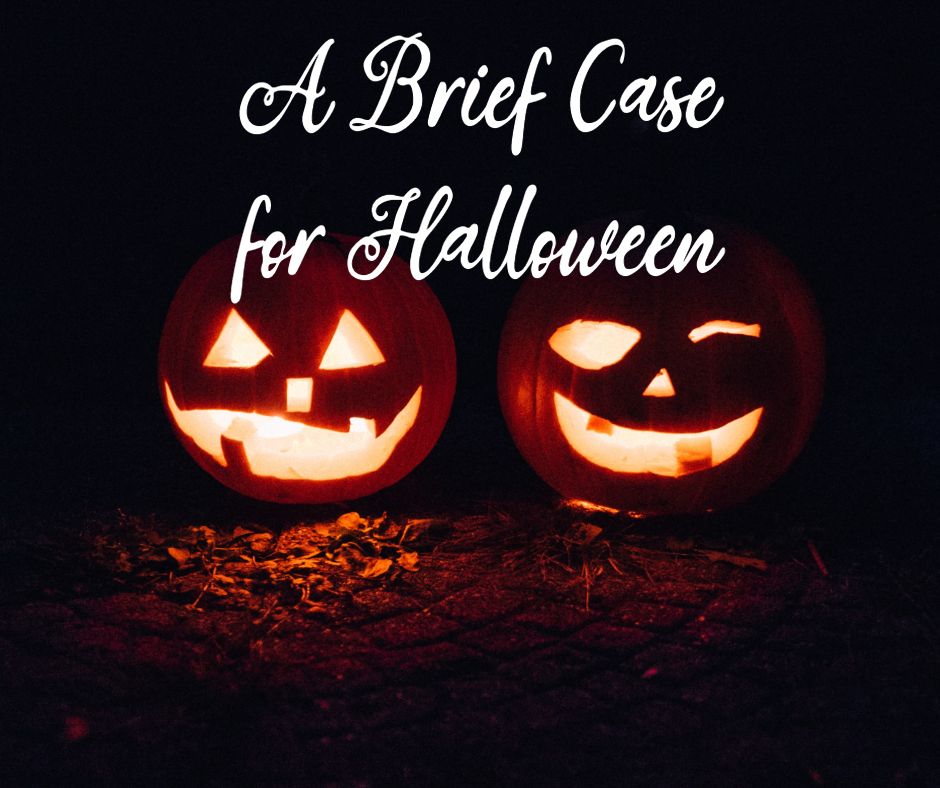By now, more than half of my readers have voted. Good. Get on with your life, people! To those whom I’ve had some influence, I am grateful. To those who continue to be as stubborn as I and unchanged, I applaud you. To those still undecided, as R.C. Sproul used to say, “What’s wrong with you people!” And to Evangelicals voting for Biden, I can no longer help you if you’re a part of the anarcho-syndicalist commune. And to all my third-party friends, I see the two of you. Being in the minority on issues is a specialty of my particular denomination. So, two very conservative cheers! Convictions aside, I know all about going against the flow.
I have argued that if we are to pray for those in authority over us (I Tim. 2:2), it follows that we should have some participation in the process. Praying for someone you’ve had no interaction with in the electoral process makes the whole process shallow.
But now that we’ve moved on, let’s talk about that Halloween business for a bit, shall we? After all, Trump is not going to give you candy. Your neighbor is. And herein lies the first case for Halloween: the neighborliness of it. Halloween is an extension of that festive spirit. We should abide by principles that establish more powerful platforms of community life. At this point, my Wendell Berry friends are cheering me on from the balcony.
I can already see from afar and up close the parents who wish to preserve decency and order in the home by keeping demons away. There is a kind of consistent curmudgeon who avoids all festivities. Christmas? Boo! Lent? Ascetic! The Feast of St. Augustine’s cat Felix? A return to sentimentalism! But Halloween, with some of these folks, receives a different kind of wrath. “Halloween?” Paganism mixed with vampiric orgies devouring candy offered to idols!
For the uninitiated, Halloween is a contraction for All Hallows’ Eve. “The word “hallow” means “saint,” in that “hallow” is just an alternative form of the word “holy” (“hallowed be Thy name”).” All Saints’ Day, which liturgical churches celebrate this Sunday, is a festive occasion remembering the faithfulness of God to the sons and daughters of the kingdom who gave their lives and from their labors now rest with Christ. Jesus claimed victory on the cross as an act of triumph (Heb. 2:14; Rom. 16:20). He died and rose so that we might live abundant lives (Jn. 10:10). We affirm and cherish the life we have and the life of the saints gone before us, who now embrace the God-given sabbatical of eternity (Heb. 4).
The Eve of that day is the traditional Halloween. Now, before you bring your Cotton Mather to bear on this question and before you show me some variation of Zechariah’s vision to make a case against offering candies to little kids, and before you claim the ancient Celtic festival as the root of all the world’s evil, let me first lay out my presupposition. And here it is: we practice Halloween at our household because Jesus makes a mockery of evil (Ps. 2, Mat. 23) and because fun is a distinctly Christian virtue. God is a playful God (a powerful Lutheran view, btw), who delights in treating evil with all the playfulness and mockery He can muster. In the divine currency, that’s an infinite supply of it.
I have interacted with anti-Halloween advocates in the Baptist, Presbyterian, Methodist, and other mainline traditions, which means you all are everywhere. But the simple outline above indicates that what we are doing on Halloween is not giving demonic powers a high-five, but we are exercising our ability as judges of angels (I Cor. 6:3) to rule over everything, including candy and captain boomerang. And if the bar of kit-kat needs saving, someone has to do it. Why not your six-year-old?
Jesus is Lord over demons and outfits of superheroes. I would like to add the caveat that if your eight-year-old is dressed like some sexy version of Catwoman, you’re doing it wrong, but I suspect most of you are more self-aware. You can participate in an event with Presbyterian zeal and have a blast without failing basic biblical principles of modesty.
In my estimation, the best way to prepare to celebrate the saints gone before us is by spending the Eve of that day eating candy, being neighborly, dressing up with your favorite outfit, and singing Psalm 2 as a parting hymn or any Luther classic. Everything is Christ’s, and we are his, and everything the world has is ours (Rom. 4:13). They may drink like sailors and eat their candy like gluttons, but we drink in honor of St. Peter and St. Augustine and eat candy for the joy set before us (Heb. 12:2).
Additional Resources:
What Should Christians Think About Halloween? By Steven Wedgeworth
Concerning Halloween by James B. Jordan














